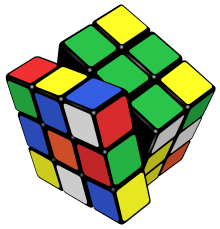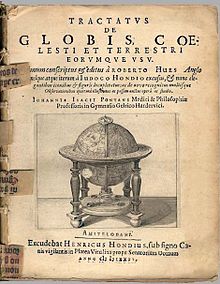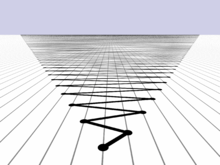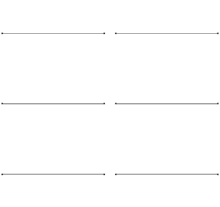Portal:Mathematics
The Mathematics Portal
Mathematics is the study of representing and reasoning about abstract objects (such as numbers, points, spaces, sets, structures, and games). Mathematics is used throughout the world as an essential tool in many fields, including natural science, engineering, medicine, and the social sciences. Applied mathematics, the branch of mathematics concerned with application of mathematical knowledge to other fields, inspires and makes use of new mathematical discoveries and sometimes leads to the development of entirely new mathematical disciplines, such as statistics and game theory. Mathematicians also engage in pure mathematics, or mathematics for its own sake, without having any application in mind. There is no clear line separating pure and applied mathematics, and practical applications for what began as pure mathematics are often discovered. (Full article...)
Featured articles –
Selected image –

Good articles –
Did you know (auto-generated) –

- ... that two members of the French parliament were killed when a delayed-action German bomb exploded in the town hall at Bapaume on 25 March 1917?
- ... that subgroup distortion theory, introduced by Misha Gromov in 1993, can help encode text?
- ... that in 1967 two mathematicians published PhD dissertations independently disproving the same thirteen-year-old conjecture?
- ... that the British National Hospital Service Reserve trained volunteers to carry out first aid in the aftermath of a nuclear or chemical attack?
- ... that circle packings in the form of a Doyle spiral were used to model plant growth long before their mathematical investigation by Doyle?
- ... that ten-sided gaming dice have kite-shaped faces?
- ... that despite a mathematical model deeming the ice cream bar flavour Goody Goody Gum Drops impossible, it was still created?
- ... that Ewa Ligocka cooked another mathematician's goose?
More did you know –

- ...that it is impossible to devise a single formula involving only polynomials and radicals for solving an arbitrary quintic equation?
- ...that Euler found 59 more amicable numbers while for 2000 years, only 3 pairs had been found before him?
- ...that you cannot knot strings in 4 dimensions, but you can knot 2-dimensional surfaces, such as spheres?
- ...that there are 6 unsolved mathematics problems whose solutions will earn you one million US dollars each?
- ...that there are different sizes of infinite sets in set theory? More precisely, not all infinite cardinal numbers are equal?
- ...that every natural number can be written as the sum of four squares?
- ...that the largest known prime number is nearly 41 million digits long?
Selected article –
 |
| Mathematics department in Göttingen where Hilbert worked from 1895 until his retirement in 1930 Image credit: Daniel Schwen |
David Hilbert (January 23, 1862, Wehlau, Prussia–February 14, 1943, Göttingen, Germany) was a German mathematician, recognized as one of the most influential mathematicians of the 19th and early 20th centuries. He established his reputation as a great mathematician and scientist by inventing or developing a broad range of ideas, such as invariant theory, the axiomization of geometry, and the notion of Hilbert space, one of the foundations of functional analysis. Hilbert and his students supplied significant portions of the mathematic infrastructure required for quantum mechanics and general relativity. He is one of the founders of proof theory, mathematical logic, and the distinction between mathematics and metamathematics, and warmly defended Cantor's set theory and transfinite numbers. A famous example of his world leadership in mathematics is his 1900 presentation of a set of problems that set the course for much of the mathematical research of the 20th century. (Full article...)
| View all selected articles |
Subcategories

Algebra | Arithmetic | Analysis | Complex analysis | Applied mathematics | Calculus | Category theory | Chaos theory | Combinatorics | Dynamical systems | Fractals | Game theory | Geometry | Algebraic geometry | Graph theory | Group theory | Linear algebra | Mathematical logic | Model theory | Multi-dimensional geometry | Number theory | Numerical analysis | Optimization | Order theory | Probability and statistics | Set theory | Statistics | Topology | Algebraic topology | Trigonometry | Linear programming
Mathematics | History of mathematics | Mathematicians | Awards | Education | Literature | Notation | Organizations | Theorems | Proofs | Unsolved problems
Topics in mathematics
| General | Foundations | Number theory | Discrete mathematics |
|---|---|---|---|
| |||
| Algebra | Analysis | Geometry and topology | Applied mathematics |
Index of mathematics articles
| ARTICLE INDEX: | |
| MATHEMATICIANS: |
Related portals
WikiProjects
![]() The Mathematics WikiProject is the center for mathematics-related editing on Wikipedia. Join the discussion on the project's talk page.
The Mathematics WikiProject is the center for mathematics-related editing on Wikipedia. Join the discussion on the project's talk page.
In other Wikimedia projects
The following Wikimedia Foundation sister projects provide more on this subject:
-
Commons
Free media repository -
Wikibooks
Free textbooks and manuals -
Wikidata
Free knowledge base -
Wikinews
Free-content news -
Wikiquote
Collection of quotations -
Wikisource
Free-content library -
Wikiversity
Free learning tools -
Wiktionary
Dictionary and thesaurus





















































